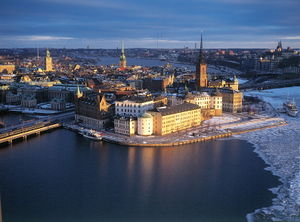No edit summary |
|||
| Line 13: | Line 13: | ||
The [http://www.government.se/ Swedish Government] established the [http://www.sei-international.org/ SEI] in 1989<ref name="SEIHistory"/> as an independent research institute that was to specialize on sustainable development and environmental policy issues.<ref name="europa">http://root.ew.eea.europa.eu/sd-online/networks/stockholm-environment-institute-sei</ref>[[Image:Stockholm.jpg|thumb|Fig 1: Stockholm]] | The [http://www.government.se/ Swedish Government] established the [http://www.sei-international.org/ SEI] in 1989<ref name="SEIHistory"/> as an independent research institute that was to specialize on sustainable development and environmental policy issues.<ref name="europa">http://root.ew.eea.europa.eu/sd-online/networks/stockholm-environment-institute-sei</ref>[[Image:Stockholm.jpg|thumb|Fig 1: Stockholm]] | ||
==The Locations== | ==Areas of Focus== | ||
SEI divides its efforts into four different specialties: | |||
===Managing environmental systems=== | |||
The SEI research and policy work under this theme focus on the best techniques to manage Earth’s land, water, and air in ways that are best for continued food production as well as sustainably. The goal is to protect biodiversity at the same time as protecting food production. Projects include sustainable urbanization in China, rainwater harvesting, and carbon cycling in forests to name just a handful. | |||
Research and projects are divided into six sub-themes: | |||
* Sustainable urbanisation | |||
* Sustainable biofuels and bioenergy | |||
* Food security, health and biodiversity | |||
* Integrating air pollution and climate change | |||
* Modelling carbon and water cycles | |||
* Energy and land-use planning | |||
===Reducing climate risk=== | |||
===Transforming governance=== | |||
===Rethinking development=== | |||
==Locations== | |||
The SEI has expanded since its creation and now includes research facilities divided into seven regions: | The SEI has expanded since its creation and now includes research facilities divided into seven regions: | ||
Revision as of 20:36, 2 April 2013
The Goal
"Our goal is to bring about change for sustainable development by bridging science and policy. We do this by providing integrated analysis that supports decision makers." [1]
The History
The Swedish Government established the SEI in 1989[1] as an independent research institute that was to specialize on sustainable development and environmental policy issues.[2]

Areas of Focus
SEI divides its efforts into four different specialties:
Managing environmental systems
The SEI research and policy work under this theme focus on the best techniques to manage Earth’s land, water, and air in ways that are best for continued food production as well as sustainably. The goal is to protect biodiversity at the same time as protecting food production. Projects include sustainable urbanization in China, rainwater harvesting, and carbon cycling in forests to name just a handful.
Research and projects are divided into six sub-themes:
- Sustainable urbanisation
- Sustainable biofuels and bioenergy
- Food security, health and biodiversity
- Integrating air pollution and climate change
- Modelling carbon and water cycles
- Energy and land-use planning
Reducing climate risk
Transforming governance
Rethinking development
Locations
The SEI has expanded since its creation and now includes research facilities divided into seven regions:
- Stockholm, Sweden
- York, United Kingdom
- Oxford, United Kingdom
- Tallinn, Estonia
- United States (Offices in Massachusetts, California, and Seattle)
- Bangkok, Thailand
- Dar Es Salaam, Tanzania
References
Category:JMC330 International Mass Communication
